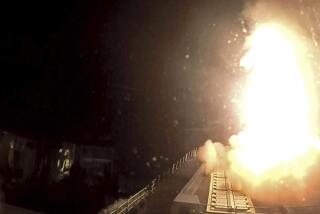Persian Gulf States Rally to Kuwait’s Defense, Say Attack on One Is Attack on All
- Share via
RIYADH, Saudi Arabia — Foreign ministers of Persian Gulf Arab states, concerned about Iranian missile strikes against Kuwait, said Sunday that any attack on one state would be viewed as an attack on them all.
Ministers of the six Gulf Cooperation Council countries said that Iranian aggression against Kuwait has seriously worsened the situation in the region.
In a carefully worded statement issued after a four-hour session, they stopped short of demanding sanctions against Tehran for three missile strikes in the last two weeks, including one on Kuwait’s main oil-loading terminal.
The ministers, who have been meeting in Riyadh for the past two days, said:
“The council notes that Iran’s behavior does not meet the needs for achieving stability in the region; accordingly the ministerial council condemns attacks and Iranian practices and reiterates that any aggression against a member state is an attack on all member states.”
‘Dangerous Escalation’
The statement said the ministers, from Saudi Arabia, Kuwait, Qatar, Bahrain, Oman and the United Arab Emirates, “discussed the dangerous escalation in the region represented by Iranian aggressions on Kuwait, a country not a party to the Iran-Iraq War.”
The economic and defense alliance, formed six months after the Iran-Iraq War began in September, 1980, urged the implementation of a resolution passed in July by the U.N. Security Council calling for a gulf war cease-fire.
Saudi Arabia, an outspoken supporter of Kuwait, called Sunday for anti-Iranian U.N. sanctions.
“We are hoping for a move by the U.N. Security Council to implement Resolution 598, and we very much hope for sanctions being imposed against the Iranian regime,” the Saudi foreign minister, Prince Saud al Faisal, said in a newspaper interview.
“Iran has violated international charters and attacked the sovereignty of Kuwait and continues to escalate the war against sister-state Iraq.”
Resolution Demands Cease-Fire
Resolution 598, passed by the Security Council last July, demands a cease-fire in the seven-year-old war and says sanctions could be imposed against the party that refuses.
The United States favors an international arms embargo against Iran, but that alternative may not win enough support.
Foreign ministers of the gulf council sought their own consensus on the Kuwaiti emergency.
The council states have given varying degrees of support to Iraq in the war but have been anxious to avoid any clash with non-Arab Iran, which is militarily much stronger than any of them and lies just across the 120-mile-wide gulf.
Gulf diplomats said that military action is clearly out of the question for council states but that Saudi Arabia wants the council to condemn Iran as an aggressor and set the stage for a broader condemnation at a planned Arab summit in Jordan on Nov. 8.
Some States Reluctant
But the diplomats said some council states that have good economic and political ties with Iran, including Oman and the United Arab Emirates, were reluctant to provoke Tehran even by condemnation.
Meanwhile, the Kuwaiti press Sunday accused Iran of responsibility for the bombing of a Pan Am ticket office in downtown Kuwait. One newspaper called for the expulsion of Shia Muslims loyal to Iran.
No one has claimed responsibility for the blast, which the newspaper Al Anbaa blamed on Iran’s “agents inside the country who have sold themselves to the devil.”
More to Read
Sign up for Essential California
The most important California stories and recommendations in your inbox every morning.
You may occasionally receive promotional content from the Los Angeles Times.













